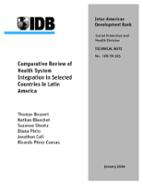Comparative Review of Health System Integration in Selected Countries in Latin America
Date
Jan 2014
This technical note presents a comparative analysis of Latin America's fragmented health systems. It provides a detailed account of health system fragmentation along six dimensions (organizations, risk pooling, eligibility, benefits, premium/contributions, payments) and the effects of historical reforms in Costa Rica, Colombia, Ecuador, Brazil, Mexico, and Chile, as well as examples of successful integration in Spain and Turkey. Additionally, it offers a set of policy options for promoting the integration of health systems and a series of practical steps for implementing health system reforms. It concludes that analyzing the fragmentation of various dimensions of health systems can be useful for developing policy, but further research is needed to determine the effect of fragmentation on health system performance.



